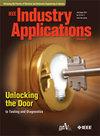PMSM 的磁涡流损耗分析和有效计算
IF 4.2
2区 工程技术
Q2 ENGINEERING, ELECTRICAL & ELECTRONIC
引用次数: 0
摘要
准确评估永磁体中的涡流损耗(ECL)对于永磁同步电机(PMSM)的热设计和运行安全至关重要。本文描述了造成 ECL 的磁通谐波的组成。以辐条式内部 PMSM 小数槽为例,验证了所获得的模式。使用有限元法进一步评估了电流谐波对 ECL 的影响,并在此基础上提出了一个仅有两个系数的简化预测模型,用于评估 PMSM 的 ECL。最后,提出了一种基于有限数量有限元情况的高效半分析综合方法,以考虑高频电流谐波对 ECL 的影响。采用冻结磁导率技术解决了铁芯饱和的问题。采用传统的时间步进有限元分析方法和所提出的半分析方法对几种运行条件下的 ECL 值和计算时间进行了比较,验证了所提出方法的准确性。结果表明,考虑到电流谐波的影响,建议的方法有可能大大缩短 ECL 评估所需的时间。本文章由计算机程序翻译,如有差异,请以英文原文为准。
Analysis and Efficient Calculation of the Magnet Eddy Current Loss of PMSM
Accurate evaluation of eddy current losses (ECL) in permanent magnets is crucial for thermal design and operational safety in permanent magnet synchronous machines (PMSMs). In this paper, the composition of magnetic flux harmonics responsible for the ECL is characterized. A spoke-type interior PMSM fractional slot is used as an example to verify the obtained patterns. The influence of current harmonics on the ECL is further evaluated using the finite element method, based on which a simplified prediction model with only two coefficients for the evaluation of ECL in PMSMs is proposed. Finally, an efficient semi-analytical synthesis method based on a limited number of finite element cases has been proposed to consider the impact of high-frequency current harmonics on the ECL. The saturation of the iron core is taken care of by adopting the frozen permeability technique. The comparison of the ECL values and the calculation time under several operation conditions when adopting the conventional time-stepping finite element analysis and the proposed semi-analytical method validate the accuracy of the proposed one. It is shown that the proposed method has the potential to significantly reduce the time needed for the evaluation of ECL considering the influence of current harmonics.
求助全文
通过发布文献求助,成功后即可免费获取论文全文。
去求助
来源期刊

IEEE Transactions on Industry Applications
工程技术-工程:电子与电气
CiteScore
9.90
自引率
9.10%
发文量
747
审稿时长
3.3 months
期刊介绍:
The scope of the IEEE Transactions on Industry Applications includes all scope items of the IEEE Industry Applications Society, that is, the advancement of the theory and practice of electrical and electronic engineering in the development, design, manufacture, and application of electrical systems, apparatus, devices, and controls to the processes and equipment of industry and commerce; the promotion of safe, reliable, and economic installations; industry leadership in energy conservation and environmental, health, and safety issues; the creation of voluntary engineering standards and recommended practices; and the professional development of its membership.
 求助内容:
求助内容: 应助结果提醒方式:
应助结果提醒方式:


